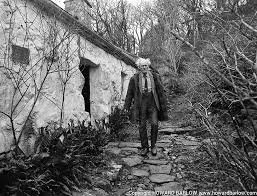R.S. Thomas (1913-2000)
I first encountered R.S.Thomas’s work in a school poetry text book in about 1975. I’ve been reading his poetry, with admiration and enjoyment, ever since.
In the twentieth century’s three horse Thomas race, I’d back R.S over Dylan and Edward.
Over the course of a long writing life he produced a enormous number of high quality poems. ‘Collected Poems 1945-1990’ and ‘Collected Later poems 1988-2000’ combined run to over 800 pages. Most of the poems, like this one, take up less than a page.
Thomas himself was an interesting man. Photographs usually present him as a wild, wind swept celtic mage, the last of the Druids lowering at the camera or striding over the hills. He spent his working life as an Anglican priest working in small Welsh parishes. He learnt Welsh, wrote at least one autobiography in Welsh, but published his poems in English. Though probably a Welsh Nationalist, he was one of the twentieth century’s leading English language poets. There’s a fine, readable, award winning biography by Byron Rogers; ‘The man who went into the west’.
Many of the poems seem to be addressed to a God who if not absent, is not paying attention, and certainly not responding. The poems are characteristically short, with abrupt, line breaks which look almost arbitrary on the page. Read aloud they lose their jaggedness. Often turning on the precise use of a word, usually containing memorable lines and images, the apparently effortless way in which a speaker addresses the reader hides a considerable art.
Despite decades of rereading, It’s hard to choose an individual poem. I have the irrational sense that if you put the two collecteds together, you might have one of the longest, and most successful poetic sequences in twentieth century English poetry..
